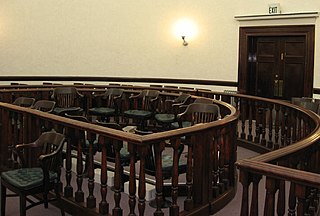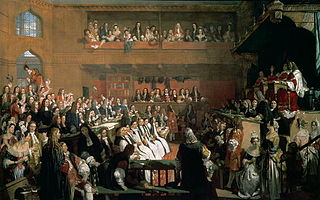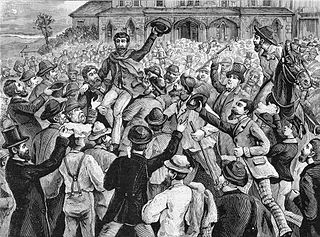The insanity defense, also known as the mental disorder defense, is an affirmative defense by excuse in a criminal case, arguing that the defendant is not responsible for their actions due to a psychiatric disease at the time of the criminal act. This is contrasted with an excuse of provocation, in which the defendant is responsible, but the responsibility is lessened due to a temporary mental state. It is also contrasted with the justification of self defense or with the mitigation of imperfect self-defense. The insanity defense is also contrasted with a finding that a defendant cannot stand trial in a criminal case because a mental disease prevents them from effectively assisting counsel, from a civil finding in trusts and estates where a will is nullified because it was made when a mental disorder prevented a testator from recognizing the natural objects of their bounty, and from involuntary civil commitment to a mental institution, when anyone is found to be gravely disabled or to be a danger to themself or to others.

A jury trial, or trial by jury, is a legal proceeding in which a jury makes a decision or findings of fact. It is distinguished from a bench trial, in which a judge or panel of judges makes all decisions.
Civil disobedience is the active, and professed refusal of a citizen to obey certain laws, demands, orders or commands of a government. By some definitions, civil disobedience has to be nonviolent to be called "civil". Hence, civil disobedience is sometimes equated with peaceful protests or nonviolent resistance. Henry David Thoreau's essay Resistance to Civil Government, published posthumously as Civil Disobedience, popularized the term in the US, although the concept itself has been practiced longer before.

A jury is a sworn body of people (jurors) convened to hear evidence, make findings of fact, and render an impartial verdict officially submitted to them by a court, or to set a penalty or judgment. Most trial juries are "petit juries", and usually consist of twelve people. A larger jury known as a grand jury has been used to investigate potential crimes and render indictments against suspects.
A lawsuit is a proceeding by one or more parties against one or more parties in a civil court of law. The archaic term "suit in law" is found in only a small number of laws still in effect today. The term "lawsuit" is used with respect to a civil action brought by a plaintiff who requests a legal remedy or equitable remedy from a court. The defendant is required to respond to the plaintiff's complaint or else risk default judgment. If the plaintiff is successful, judgment is entered in favor of the plaintiff, and the Court may impose the legal and/or equitable remedies available against the defendant (respondent). A variety of court orders may be issued in connection with or as part of the judgment to enforce a right, award damages or restitution, or impose a temporary or permanent injunction to prevent an act or compel an act. A declaratory judgment may be issued to prevent future legal disputes.

Jury nullification, also known in the United Kingdom as jury equity, or a perverse verdict, is when the jury in a criminal trial gives a verdict of not guilty even though they think a defendant has broken the law. The jury's reasons may include the belief that the law itself is unjust, that the prosecutor has misapplied the law in the defendant's case, that the punishment for breaking the law is too harsh, or general frustrations with the criminal justice system. Some juries have also refused to convict due to their own prejudices in favor of the defendant. Such verdicts are possible because a jury has an absolute right to return any verdict it chooses. Nullification is not an official part of criminal procedure, but is the logical consequence of two rules governing the systems in which it exists:
- Jurors cannot be punished for passing an incorrect verdict.
- In many jurisdictions, a defendant who is acquitted cannot be tried a second time for the same offense.

In common law jurisdictions, an acquittal means that the criminal prosecution has failed to prove that the accused is guilty beyond a reasonable doubt of the charge presented. It certifies that the accused is free from the charge of an offense, as far as criminal law is concerned. The finality of an acquittal is dependent on the jurisdiction. In some countries, such as the United States, an acquittal prohibits the retrial of the accused for the same offense, even if new evidence surfaces that further implicates the accused. The effect of an acquittal on criminal proceedings is the same whether it results from a jury verdict or results from the operation of some other rule that discharges the accused. In other countries, like Australia and the UK, the prosecuting authority may appeal an acquittal similar to how a defendant may appeal a conviction — but usually only if new and compelling evidence comes to light or the accused has interfered with or intimidated a juror or witness.
In United States law, a motion is a procedural device to bring a limited, contested issue before a court for decision. It is a request to the judge to make a decision about the case. Motions may be made at any point in administrative, criminal or civil proceedings, although that right is regulated by court rules which vary from place to place. The party requesting the motion is the moving party or movant. The party opposing the motion is the nonmoving party or nonmovant.
Not proven is a verdict available to a court of law in Scotland. Under Scots law, a criminal trial may end in one of three verdicts, one of conviction ("guilty") and two of acquittal.
The Fully Informed Jury Association (FIJA) is a United States national jury education organization, incorporated in the state of Montana as a 501(c)(3) not-for-profit organization. It works to educate citizens on their authority when they serve as jurors. FIJA's stated aims are to educate the public, provide commentary on current jury-related cases, and assist defendants with jury authority strategies — including the right to veto bad laws and the misapplication of laws by refusing to convict the defendant. The organization was formed in 1989 by Larry Dodge, a Montana businessman, and his friend Don Doig. It was formed following discussions about forming such a group at the National Libertarian Party convention in Philadelphia in 1989.
In the law of evidence in the United States, public policy doctrines for the exclusion of relevant evidence encompass several types of evidence that would be relevant to prove facts at issue in a legal proceeding, but which are nonetheless excluded because of public policy concerns. There are five major areas of exclusion that arise out of the Federal Rules of Evidence ("FRE"): subsequent remedial measures, ownership of liability insurance, offers to plead guilty to a crime, offers to settle a claim, and offers to pay medical expenses. Many states have modified versions of the FRE under their own state evidence codes which widen or narrow the public policy exclusions in state courts.
A system for trial by jury was first introduced in 1923 under Prime Minister Katō Tomosaburō's administration. Although the system generated relatively high acquittal rates, it was rarely used, in part because it required defendants to give up their rights to appeal the factual determinations made. The system lapsed by the end of World War II. In 2009, as a part of a larger judicial reform project, laws came into force to introduce citizen participation in certain criminal trials by introducing lay judges. Lay judges comprise the majority of the judicial panel. They do not form a jury separate from the judges, as in a common law system, but participate in the trial as inquisitorial judges next to professional judges in accordance with the civil law legal tradition – similar to the French cour d'assises – who actively analyze and investigate evidence presented by the defense and prosecution.

The Camden 28 were a group of leftist, Catholic, anti-Vietnam War activists who in 1971 planned and executed a raid on a draft board in Camden, New Jersey, United States. The raid resulted in a high-profile criminal trial of the activists that was seen by many as a referendum on the Vietnam War and as an example of jury nullification.
United States criminal procedure derives from several sources of law: the baseline protections of the United States Constitution; federal and state statutes; federal and state rules of criminal procedure ; and state and federal case law. Criminal procedures are distinct from civil procedures in the US.
In the United States, jury nullification occurs when a jury in a criminal case reaches a verdict contrary to the weight of evidence, sometimes because of a disagreement with the relevant law. It has its origins in colonial America under British law. The American jury draws its power of nullification from its right to render a general verdict in criminal trials, the inability of criminal courts to direct a verdict no matter how strong the evidence, the Fifth Amendment's Double Jeopardy Clause, which prohibits the appeal of an acquittal, and the fact that jurors cannot be punished for the verdict they return.
The Double Jeopardy Clause of the Fifth Amendment to the United States Constitution provides: "[N]or shall any person be subject for the same offence to be twice put in jeopardy of life or limb..." The four essential protections included are prohibitions against, for the same offense:
A shadow defense is a legal defense that cannot be sustained on its own merits but opens the door to introducing evidence that will assist in seeking jury nullification, and gives the jury an excuse to acquit. A "shadow defense" also may refer to a tactic by defending counsel that is not expected to be successful as a matter of law; it is, instead, a pretext for bringing information into the court that would otherwise be irrelevant and therefore inadmissible.
A political trial is a criminal case wherein the defendant is tried for reasons considered politically motivated—that is, those with varying degrees of opposition to government policy—in order to effectively silence or discredit them. It generally occurs in states with minimal rule of law protections, alternatively characterized as authoritarian, illiberal, or totalitarian.
A technical defense is one used by a defendant to seek acquittal based on the technicalities of the law. It is in contrast to a political defense which seeks to use political arguments to persuade a jury to nullify. Sometimes the desire to convince a jury on political and moral grounds is so strong that political defendants will reject a potent technical defense.
Burks v. United States, 437 U.S. 1 (1978), is a United States Supreme Court decision that clarified both the scope of the protection against double jeopardy provided by the Fifth Amendment to the United States Constitution and the limits of an appellate court's discretion to fashion a remedy under section 2106 of Title 28 to the United States Code. It established the constitutional rule that where an appellate court reverses a criminal conviction on the ground that the prosecution failed to present sufficient evidence to prove the defendant's guilt beyond a reasonable doubt, the Double Jeopardy Clause shields the defendant from a second prosecution for the same offense. Notwithstanding the power that appellate courts have under section 2106 to "remand the cause and direct the entry of such appropriate judgment, decree, or order, or require such further proceedings to be had as may be just under the circumstances," a court that reverses a conviction for insufficiency of the evidence may not allow the lower court a choice on remand between acquitting the defendant and ordering a new trial. The "only 'just' remedy" in this situation, the Court held, is to order an acquittal.




